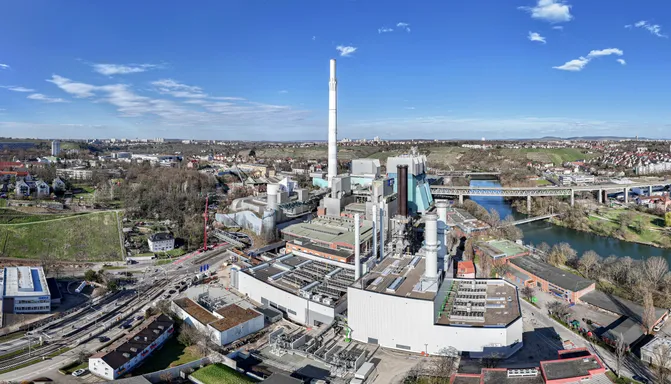Highlights
- Stuttgart-Münster site a signal for further urgently needed investment in dispatchable power plant capacity
- Commissioning marks further progress for EnBW in decarbonizing its power plant portfolio
- Stuttgart to be coal-free

Stuttgart. Against a backdrop of intensive policy debate on the legal framework for financing urgently needed investment in dispatchable power plant capacity, EnBW has officially commissioned one of Germany's first hydrogen-ready gas turbine power plants at its Stuttgart-Münster site. The project is an important signal for more plants of a similar type - especially considering that southern Germany has a particularly pressing need for highly flexible power plants to complement weather-dependent renewable energy sources and to maintain grid stability. EnBW CEO Dr. Georg Stamatelopoulos: "The power plants needed for the energy transition cannot be financed by the market alone. This is why the German government needs to create a framework of regulatory incentives for more investment as part of its program for the first 100 days in power."
In further fuel switch projects, EnBW is converting the previously coal-fired sites in Altbach/Deizisau and Heilbronn to hydrogen-ready gas-fired power plants. In this way, EnBW is continuing the decarbonization of its power plant portfolio. This relates to total capacity of 1.5 gigawatts and total investment of some 1.6 billion. Renewable energy sources now already account for around 59% of EnBW's installed generation capacity. As of the 2024 financial year, the Group had already reduced its carbon intensity by 45% compared to 2022 (to 272g/kWh).
The Stuttgart-Münster site stands out in the EnBW power plant portfolio. Its focus is on the thermal treatment of waste, otherwise known as waste incineration. To get the most out of the fuel, it operates on the combined heat and power (CHP) principle, generating heat energy for district heating along with electricity. Three coal-fired boilers have so far supplied additional heat when the waste incineration plant does not produce enough for the district heating network in winter. Those coal-fired boilers are now being replaced by the new hydrogen-ready gas-fired power plant. The existing CHP plant comprises a hard coal-fired power plant with three coal-fired boilers, a waste incineration plant with three waste-fired boilers, and three steam turbines. Since April 2024, a large heat pump has additionally been generating up to 24 megawatts of heat energy for district heating.
Together with the Stuttgart-Gaisburg and Altbach/Deizisau CHP plants, the plant serves a district heating network covering the central River Neckar region, supplying heat to over 28,500 homes, 1,400 businesses and 380 public facilities in and around Stuttgart.
After around three years of planning and approval processes and two years of construction, the Stuttgart-Münster site has now been comprehensively modernized with the construction of a new gas turbine plant that has a gross capacity of two times 62 megawatts, including waste heat boilers and hot water boilers. The CHP plant is used for both base load and peak load supply. The new fuel switch plant will consequently supply the city of Stuttgart with 124 megawatts of electrical energy and 370 megawatts of thermal energy.
Following successful trials, the plant will go into commercial operation in the near future. Peter Heydecker, Chief Operating Officer for Sustainable Generation Infrastructure at EnBW: "The energy transition is underway. EnBW is currently building half of all gas-fired power plants now under construction in Germany. Solely by switching from from coal to natural gas, we are making dispatchable generation significantly more climate-friendly with around 50% lower carbon emissions. From the mid-2030s, we expect to take the next step and, after a second fuel switch, operate the plant on up to 100% low-carbon hydrogen, provided that this is available in sufficient quantities.
Dr.-Ing. Christian Bruch, CEO of gas turbine manufacturer Siemens Energy AG: "Our technologies make it possible to replace fossil fuels with renewable energy sources and green gases such as hydrogen. Our innovative solutions help increase power plant efficiency and flexibility while reducing carbon emissions. We therefore see ourselves as a key partner in transforming the energy system."
After a short period running in parallel, the coal-fired unit and the fuel oil-fired gas turbines within the old cogeneration plant at the Münster site will be completely decommissioned in the spring of 2026. This will contribute significantly to climate change mitigation in the City of Stuttgart, which is aiming for net zero by 2035. Dr. Frank Nopper, Lord Mayor of the City of Stuttgart: "This project shows how energy companies and local partners can pull together and make the energy transition succeed. The commissioning of the new gas turbine power plant in Stuttgart-Münster marks an important milestone in that transition for Stuttgart. By using natural gas, the city of Stuttgart's district heating will be made completely coal-free and carbon emissions will go down by around 60% by 2030. This is a good example of how traditional power plant sites can be made sustainable for the benefit of all."
Dr. Andre Baumann, State Secretary at the Baden-Württemberg Ministry of the Environment, Climate and Energy: "The State of Baden-Württemberg is a pioneer in the heat energy transition, with our municipal heat plans providing the blueprint for the municipal heat planning legislation adopted at national level. New gas-fired power plants like this one in Stuttgart-Münster will also play a key role in the ongoing success of the heat energy transition in Baden-Württemberg."
The H -ready fuel-switch power plant is also an important component in the further expansion of renewable energy, as it is a highly flexible plant that can start up very quickly in response to grid fluctuations when weather conditions cause a shortage of renewable electricity. This means it contributes significantly to the security of supply in southern Germany.








